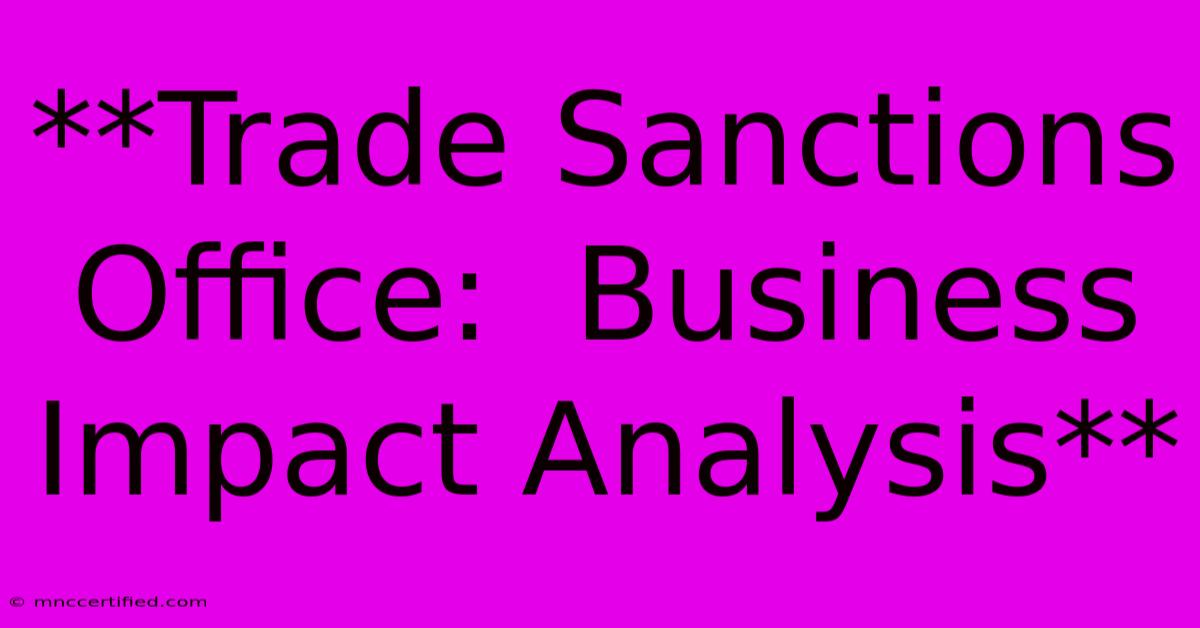**Trade Sanctions Office: Business Impact Analysis**

Table of Contents
Trade Sanctions Office: Understanding the Impact on Your Business
Navigating the complex world of international trade can be challenging enough, but the added layer of trade sanctions makes it even more intricate. Understanding the Trade Sanctions Office (TSO) and its role in enforcing economic restrictions is crucial for businesses seeking to operate globally. This article will explore the TSO and its impact on businesses, focusing on conducting business impact analysis to identify potential risks and mitigating strategies.
What is the Trade Sanctions Office (TSO)?
The Trade Sanctions Office is a key component within the U.S. Department of the Treasury responsible for implementing and enforcing economic sanctions programs mandated by the U.S. government. These sanctions target individuals, entities, and countries that pose a threat to national security, foreign policy, or economic interests.
The TSO's primary responsibilities include:
- Developing and implementing sanctions regulations: The TSO drafts and updates regulations that define the scope of sanctions programs, specifying which activities are prohibited and the penalties for violating those restrictions.
- Monitoring compliance: The TSO works to identify and investigate potential violations of sanctions regulations, leveraging intelligence gathering and data analysis to monitor global financial transactions and business activities.
- Enforcing sanctions: The TSO has the authority to impose penalties on individuals and entities found to have violated sanctions regulations. These penalties can include fines, asset freezes, and even criminal prosecution.
How Do Trade Sanctions Affect Businesses?
Trade sanctions directly impact businesses by restricting:
- Exports and imports: Sanctions can prohibit or limit the trade of certain goods and services to or from specific countries or entities.
- Financial transactions: Sanctions may restrict financial transactions with designated individuals, entities, or countries.
- Investments: Sanctions can prohibit investments in specific sectors or companies deemed to be involved in prohibited activities.
Understanding the potential impact of trade sanctions is crucial for businesses operating internationally. Failing to comply with sanctions regulations can lead to significant financial penalties, reputational damage, and even legal action.
Conducting a Business Impact Analysis: A Proactive Approach
A business impact analysis is essential for proactively identifying potential risks and mitigating strategies. This analysis involves evaluating the following aspects:
- Identifying potential impact areas: Analyze the impact of sanctions on various aspects of your business, including supply chain, finance, marketing, and operations.
- Assessing the severity of the impact: Determine the potential financial losses, reputational damage, and operational disruptions that could result from sanctions.
- Developing mitigation strategies: Create proactive strategies to minimize the impact of sanctions. This could involve diversifying supply chains, exploring alternative financial institutions, or adapting marketing strategies.
- Monitoring regulatory changes: Stay updated on the latest sanctions regulations and amendments issued by the TSO.
Tips for Navigating Trade Sanctions
- Consult with legal experts: Seek legal advice from specialists in international trade and sanctions compliance to understand the specific implications for your business.
- Utilize available resources: The TSO website provides comprehensive information on sanctions programs, regulations, and compliance guidance.
- Implement a compliance program: Develop and implement a robust sanctions compliance program that includes training, monitoring, and reporting mechanisms.
- Maintain accurate records: Keep detailed records of all transactions and interactions related to countries or entities subject to sanctions.
- Be transparent and cooperative: If a potential violation occurs, be transparent with authorities and cooperate fully with any investigations.
Conclusion
Understanding the Trade Sanctions Office and its impact on businesses is critical for ensuring compliance and mitigating potential risks. By conducting a comprehensive business impact analysis, implementing robust compliance strategies, and staying informed about regulatory changes, businesses can minimize the impact of sanctions and operate responsibly in the global marketplace. Remember that compliance is not only a legal obligation but a strategic imperative for long-term success in international trade.

Thank you for visiting our website wich cover about **Trade Sanctions Office: Business Impact Analysis** . We hope the information provided has been useful to you. Feel free to contact us if you have any questions or need further assistance. See you next time and dont miss to bookmark.
Featured Posts
-
Can The Person Who Posted Bond Revoked It
Nov 07, 2024
-
Jd Vance Trump Critic To Vp
Nov 07, 2024
-
Watch Warriors Celtics Nba Live Free Today
Nov 07, 2024
-
Ukraine Congratulates Trump Watches Gop
Nov 07, 2024
-
Elon Musk Gains 15 Billion After Trump Victory
Nov 07, 2024